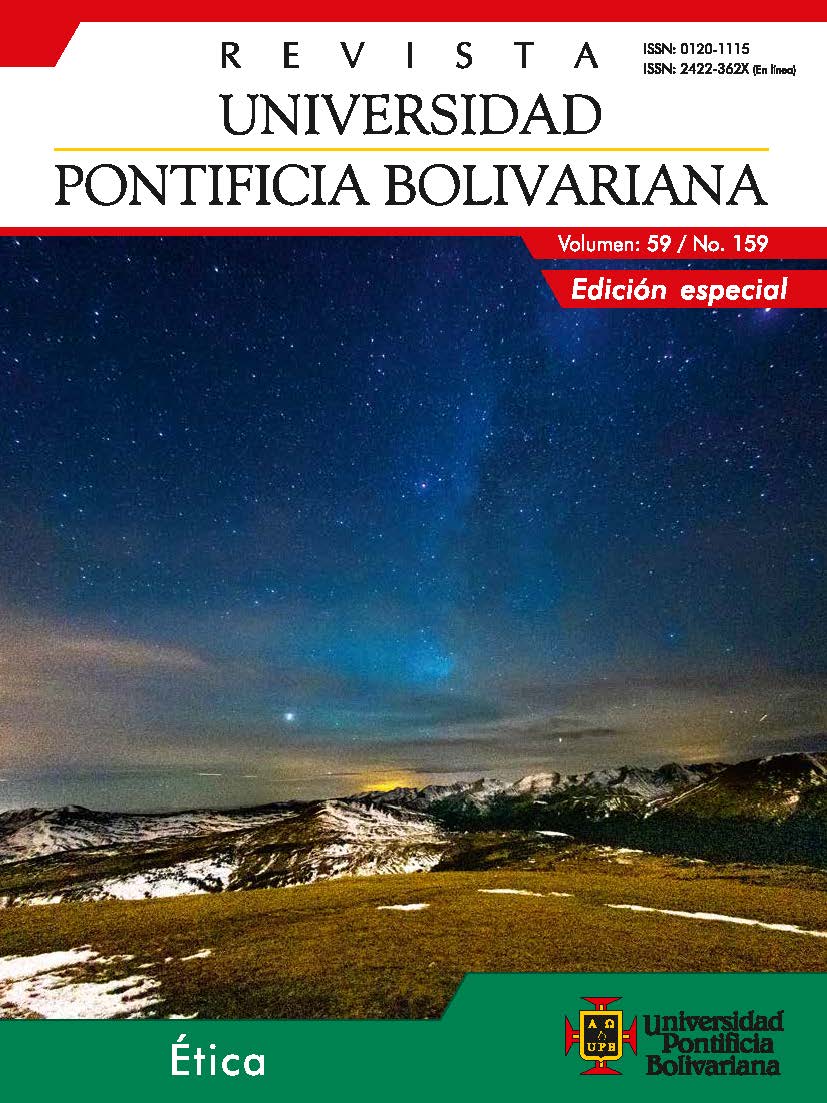Marco ético anidado en la investigación biomédica, desde su ejecución a la socialización: reto de principios y de práctica
Contenido principal del artículo
Resumen
En el escenario mundial el desarrollo tecnológico y científico marca el contexto de las capacidades de competitividad y de innovación de las sociedades. Sin embargo, muchas veces el interés de la ciencia parece pretender alimentar más el fanatismo tecnológico entrehilándose en desafíos, más que en verdaderas necesidades. En el área biomédica los retos motivados por intereses industriales, productivos, académicos y otros, llevan a hacer una reflexión crítica sobre las condiciones de la investigación y su verdadera intensión de sellar una brecha para el bienestar de la comunidad, que muchas veces representa explícitamente una mera expresión de aspiraciones y pretensiones, que no necesariamente representan un bien en el sentido de lo humano. En el presente artículo se antepone que la investigación biomédica está sujeta a normas éticas que sirven para promover y asegurar el respeto a los seres vivos, a proteger su salud y sus derechos fundamentales. Así, aunque el objetivo principal de la investigación es propiciar nuevos conocimientos, este objetivo nunca puede tener primacía sobre los derechos y los intereses de los sujetos participantes de la investigación.
Citas
Beauchamp, T.L., Childress, J.F. (2013). Principles of biomedical ethics. New York: Oxford University Press. Seventh Edition. ISBN 978-0-19-992458-5.
Bustamante J. (2009). Bioingeniería e ingeniería biomédica en Colombia: trasegando en sus inicios y en la construcción de su futuro. Rev Ing Biomédica, 3(5), 15-21.
Bustamante J. (2007). La evolución de la tecnología cardiovascular a partir de la investigación interdisciplinaria. Sociedad Iberoamericana de Información Científica SIIC, SIICSalud ISSN 1667-9008. Abril, 1-6.
Committee on Publication Ethics COPE. Available on the COPE website (https://publicationethics. org/, accessed 6 May 2020)
Consejo Nacional de Acreditación CNA. Criterios de la acreditación institucional, EN: Lineamientos para la acreditación institucional (2006). Bogotá: CORCAS Editores Ltda. Serie Documentos CNA No. 2. ISSN 0122-7874.
International Committee of Medical Journal Editors ICMJE. Disclosure of financial and non-financial relationships and activities, and conflicts of interest (2020). Available on the ICMJE website (http://www.icmje.org/recommendations/
browse/roles-and-responsibilities/ author-responsibilities--conflicts-of-interest. html, accessed 25 May 2020).
International Committee of Medical Journal Editors ICMJE. Overlapping publications (2020). Available on the ICMJE website (http:// www.icmje.org/recommendations/browse/publishing-and-editorial-issues/overlappingpublications. html, accessed 25 May 2020).
International Organizations of Medical Sciences. International ethical guidelines for biomedical research involving human subjects, Revising the 2002 version by Executive Committee (EC) of Council for International Organizations of Medical Sciences CIOMS, November 2016 (2016). Available on the CIOMS website (https://cioms.ch/revising-2002-cioms-ethical-guidelines-biomedical-research-involvinghuman-subjects/, accessed 25 May 2020).
Jie, C., Fang, L., Zheng-Li, S. (2019). Origin and evolution of pathogenic coronaviruses. NATURE Microbiology, 17, 181-192.
Menachery, V., Yount, B., Debbink, K., et al. (2015). A SARS-like cluster of circulating bat coronaviruses shows potential for human emergence. Nature Medicine, 21(12), 1508-1513.
Siurana-Aparisi, J. C. (2010). Los principios de la bioética y el surgimiento de una bioética intercultural. VERITAS, 22, 121-157.
United Nations. Sustainable Development Goals, 2015. Available on the UN website (https://www.un.org/sustainabledevelopment/, accessed 29 May 2020). World Association of Medical Editors WAME. Available on the WAME website (https://www. wame.org/, accessed 6 May 2020).
World Association of Medical Editors WAME. Available on the WAME website (https://www.wame.org/, accessed 6 May 2020).
World Health Organization. Standards and operational guidance for ethics review of health-related research with human participants. Geneva: World Health Organization WHO (2011). ISBN: 978-92-4-150294-8. Available on the WHO website (www.who.int/ ethics/publications/9789241502948/en/, accessed 25 May 2020).
World Health Organization. Guidance for managing ethical issues in infectious disease outbreaks. Geneva: World Health Organization WHO (2016). ISBN 978-92-4-154983- 7. Available on the WHO website (https://apps.who.int/iris/handle/10665/250580, accessed 25 May 2020).
World Medical Association. Declaration of Helsinki – Ethical principles for medical research involving human subjects, Amended by the 64ª Asamblea General, Fortaleza, Brasil, octubre 2013. Ferney-Voltaire:
World Medical Association (2013). Available on the WMA website (https://www. wma.net/policies-post/wma-declarationof-
helsinki-ethical-principles-for-medicalresearch-involving-human-subjects/, accessed 25 May 2020).


